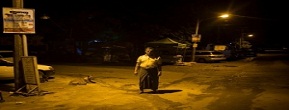Burma Muslims lose trust
 After decades of peaceful co-existence with the Buddhist majority, fears and mistrust are prevailing among the Muslim community in Burma in the wake of deadly bouts of sectarian attacks.
After decades of peaceful co-existence with the Buddhist majority, fears and mistrust are prevailing among the Muslim community in Burma in the wake of deadly bouts of sectarian attacks.
“We are losing trust with each other,” U Aye, a Muslim used-car salesman, told The New York Times on Wednesday, July 3.
“Any business transaction between a Buddhist and a Muslim can turn into an incident.”
Fears have been gripping Burmese Muslims after repeated attacks by Buddhists in recent months since last year’s sectarian violence which killed more than 200 people and displaced thousands.
Anti-Muslim violence engulfed central Burma last April after an argument between a Buddhist couple and gold shop owners, leaving at least 42 people dead.
Monks were blamed for inciting hatred against Muslims by preaching a so-called “969 movement” which represents a radical form of anti-Islamic nationalism that urges Buddhists to boycott Muslim-run shops and services.
“The government cannot guarantee our safety,” said U Nyi Nyi, a businessman, who is organizing a group of men guarding their neighborhood in the capital Yangon.
“I don’t think the police will protect us.”
Rights groups have accused the Burmese police of turning a blind eye to attacks against Muslims.
Burma’s Muslims -- largely of Indian, Chinese and Bangladeshi descent -- account for an estimated four percent of the roughly 60 million population.
Muslims entered Burma en masse for the first time as indentured laborers from the Indian subcontinent during British colonial rule, which ended in 1948.
But despite their long history, they have never fully been integrated into the country, widely considered as foreigners.
Hatred
Muslims say they have never experienced such hatred against their community.
“This is the first time we experience this in our lifetime,” said U Maung Maung Myint, who runs an import-export company and is one of the trustees of the Bengali mosque in Yangon.
The anti-Muslim violence has raised doubts on the success of Burma’s transition from 49 years of oppressive military rule that ended in March 2011.
Maung Maung said he feels betrayed by official failure to protect Muslims and deal with them as citizens with equal rights.
“We marched in front of the American Embassy and chanted, ‘We want democracy!’ ” he said.
“We hoped our lives would be more peaceful — we didn’t expect this.”
U Khin Maung Htay, 59, recalls how his grocery shop was attacked by a Buddhist mob in Hlaing Thaya Township in February.
“I called police, but they said, ‘Don’t worry, there’s no problem,’”
He said police had left after failing to persuade the crowds to disperse, leaving mobs to destroy his shop and loot it.
The Muslim man fled his home and is now a refugee in his own city, crammed in a two-bedroom apartment in central Yangon with 22 other relatives.
He tried to return to the neighborhood, he said, but angry residents, some of them former customers, shouted abuse and threatened him.
“They said: ‘Go back to India! Go back to Bangladesh!’”.-http://en.shafaqna.com
Source: On Islam
Add new comment